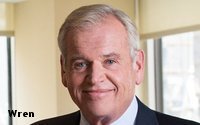Omnicom Group CEO John Wren Takes Small 2015 Pay Cut
- by Steve McClellan @mp_mcclellan, April 15, 2016

Omnicom Group CEO John Wren took a 2% cut in total compensation in 2015, according to the company’s latest Proxy Statement filed with the SEC late Thursday.
The firm — holding company for numerous advertising and marketing shops, including BBDO, DDB, OMD and PHD — issued its 2016 proxy statement in advance of the company’s upcoming annual meeting, to be held May 24 at Zimmerman Advertising in Fort Lauderdale, Fla.
Still, Wren had a nice year with total compensation of $23,576,047 — which was only down about $500,000 from his total take in 2014.
Like other CEOs in the sector, Wren’s compensation is primarily performance-based. His annual salary last year was $1 million, unchanged from the year before.
Metrics used to calculate his bonuses and stock grants include organic revenue growth, as well as profit margin and earnings per share growth. How the company’s growth (or lack of it) compares to competitors is also a factor in determining Wren’s total compensation.
advertisement
advertisement
Omnicom’s organic growth was 5.3% last year, while margins were flat and eps was up around 4%.
Omnicom’s filing followed that of Interpublic Group’s earlier this week, which indicated that IPG CEO Michael Roth received a 12% bump in total compensation last year to nearly $14.5 million.
Omnicom’s proxy led off with a letter from the company’s new lead independent director, Leonard Coleman, who reported some changes regarding the makeup of the company’s board. Those changes were driven in part by a shareholder resolution last year (which has been resubmitted this year) that would require future Chairmen of the Board to be independent board members.
Current chairman Bruce Crawford, 87, is considered an insider, given his long association with the company including his tenure as CEO prior to Wren.
Last year’s proposal drew 54% support of voted shares, although Coleman reported that the current board would not adopt it. In follow-up discussions with shareholders, Coleman wrote “what we heard from many was that their vote in favor of the shareholder proposal was not specifically about having an independent Chairman. Rather it was a way to signal dissatisfaction on other governance matters, namely the lengthy average tenure of our directors, a lack of meaningful board refreshment and the implications these factors could have on independent oversight.”
Based on that feedback, Coleman added, the Board has taken a number of steps to be responsive. Those steps include adoption of a new mandatory retirement policy for board members when they reach the age of 75. The rule takes effect at the end of 2017. Exemptions are possible, and would be explained when they are made.
That said, Coleman reported that the new policy will result in six of the current 14 board members stepping down over the next two years, including Gary Roubos and Errol Cook, who will leave at the end of their current terms. (The firm has just added one new board member: Deborah Kissire, 58, a former managing partner at Ernst & Young.)
The board has also adopted a so-called “proxy access” mechanism that would allow a group of up to 20 shareholders owning a total of at least 3% of shares for at least three years to nominate a minimum of two new independent board members (but no more than 20% of the existing board) via the annual proxy statement.
An IPG shareholder has proposed a similar mechanism to be voted on at that company’s annual meeting next month, although the company has recommended voters oppose it, suggesting it is unneeded and would be disruptive.
Coleman also noted that the board has expanded the lead independent director’s duties — that is, his current role — making them largely equivalent to responsibilities “typically associated with the role of Chairman.” Among other duties, he will be on the governance committee, participate in succession planning and preside at all board meetings where Crawford is not present.
Once again this year, the Office of Controller of the City of New York has weighed in with a proposal to require Omnicom to make public its filings with the Equal Employment Opportunities Commission, which provide a breakdown of its workforce by race and gender according to 10 employment categories.
The proposal has been voted down several times in the past and the company noted that it publishes a separate but similar set of diversity statistics on its Web site.


